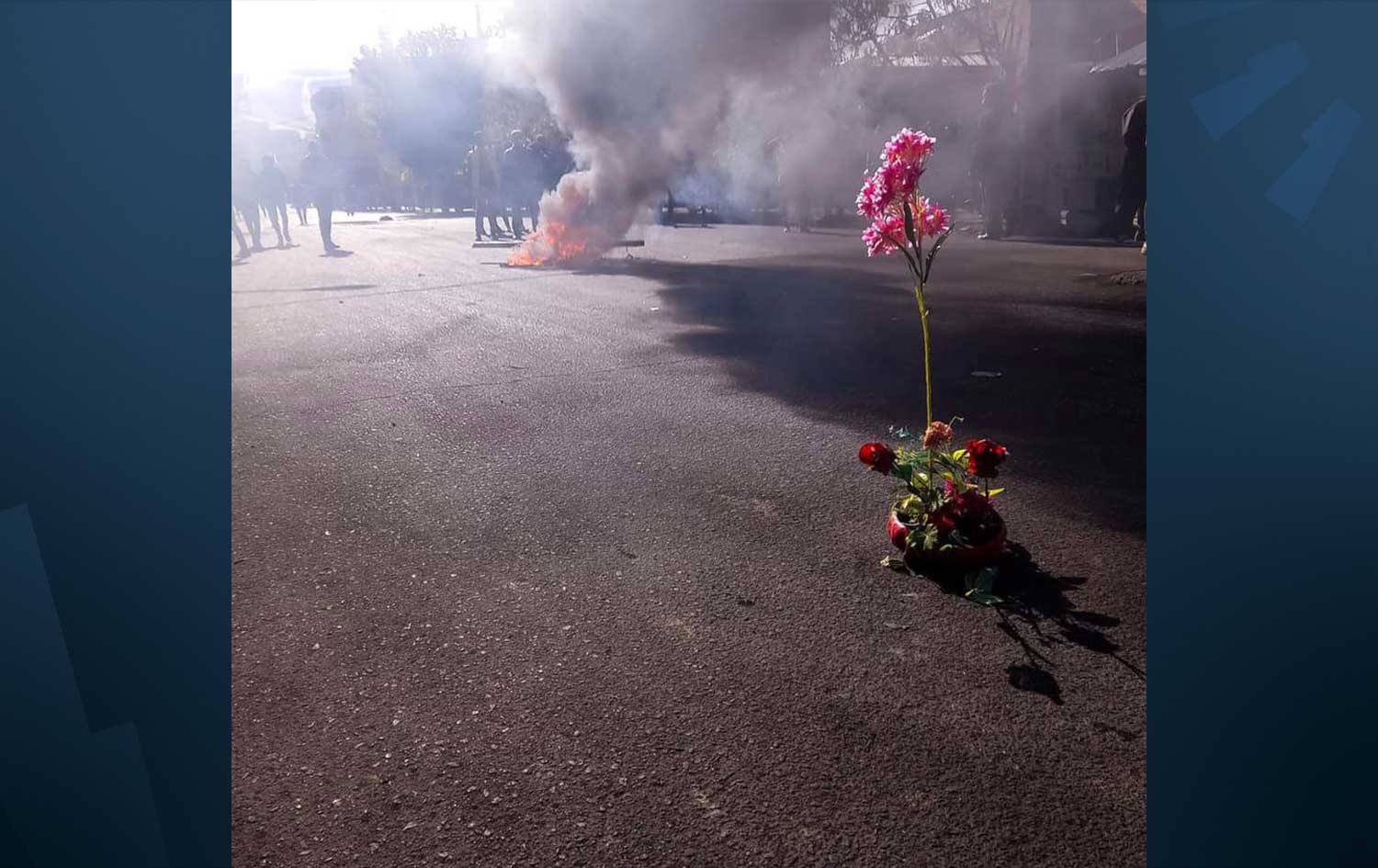
Two children on a car during a protester funeral in Mahabad. Date: November 18, 2022. Photo: Hengaw
ERBIL, Kurdistan Region - Islamic Revolutionary Guard Corps (IRGC) and its militia Basij killed 25 protesters in the Kurdish areas in three days of intense unrest raising the number of Kurdish protesters killed to 83 since the death of Mahsa Amini in morality police custody on September 16.
The violent protest started on Tuesday evening one day after the IRGC fired a number of missiles and kamikaze drones at the bases of Kurdish opposition groups, killing at least two Peshmerga fighters. Tehran says that Kurdistan Democratic Party of Iran (KDPI) and leftist Komala party are responsible for the unrest in the Kurdish areas which have become the main engine of the protest across Iran. IRGC has even threatened to launch a ground offensive against the opposition groups in the Kurdistan Region.
“The security and intelligence forces of the Islamic Republic of Iran have continued their violent crackdown against public protest and from 15th to 18th of November … [they] killed at least 25 Kurdish citizens in the cities of Bukan, Mahabad, Sanandaj, Kamyaran, Piranshahr, and Baneh,” Paris-based Kurdistan Human Rights Network said on Saturday. The protest also coincided with the third anniversary of the killing of 1,500 protesters and bystanders during November 2019 nationwide protest.
The watchdog said that the number of wounded and arrested people is high and there is no information about where some of the detainees have been held. At least one protester was killed under torture in Sanandaj on Friday, Hengaw Human Rights Organisation said. The killing of the 25 Kurds in three days of unrest raises the total number of Kurdish citizens killed in the four main provinces in west of the country to 83 people. The number of protesters killed across the country as of Friday evening stood at 402, including 58 children and teenagers, according to tally provided by US based Human Rights Activists News Agency (HRANA) .
“The intelligence services have exerted enormous pressure on the families and threatened them in order to hand back the bodies of the deceased and allow them to hold funerals,” KHRN said.
The official newspaper of the government, Iran Newspaper, said that 14 members of the security forces were killed ruing the three days of unrest.
Amongst the 25 killed was 17 year old boy Danial Pabanadi, who was killed on Wednesday in Saqez city, the birthplace of Mahsa Amini, whose killing by the morality police on September 16 sparked the protest across the country.
Six of the 25 protesters were killed on Thursday evening and the early hours of Friday morning in the town of Bukan. The IRGC and plain clothes agents attacked a funeral of a notable personality of the Yarsan religious group in the city of Sahneh in Kermansnah province on Friday, using tear gas and beating up many mourners. In the ensuing chaos Colonel Nadir Birami , the intelligence chief of the IRGC in the city, was knifed to death.

The IRGC has responded and has detained dozens of activists from the religious group.
There were calls on Saturday from hardliners for the security forces to kill more protesters, following the death of the members of the security forces. Iran judiciary officials have said that they would have no mercy on the protesters.
Several protesters have been sentenced to death after being accused of carrying arms or killing members of the security forces. The government crackdown against protesters has come under increasing international scrutiny as the UN Human Rights Council is expected to hold a special session on November 24.
The US and the EU and Canada are placing more sanctions on Iranian officials and entities including several reporters on Iranian national TV that have been accused of working as interrogators.









Comments
Rudaw moderates all comments submitted on our website. We welcome comments which are relevant to the article and encourage further discussion about the issues that matter to you. We also welcome constructive criticism about Rudaw.
To be approved for publication, however, your comments must meet our community guidelines.
We will not tolerate the following: profanity, threats, personal attacks, vulgarity, abuse (such as sexism, racism, homophobia or xenophobia), or commercial or personal promotion.
Comments that do not meet our guidelines will be rejected. Comments are not edited – they are either approved or rejected.
Post a comment